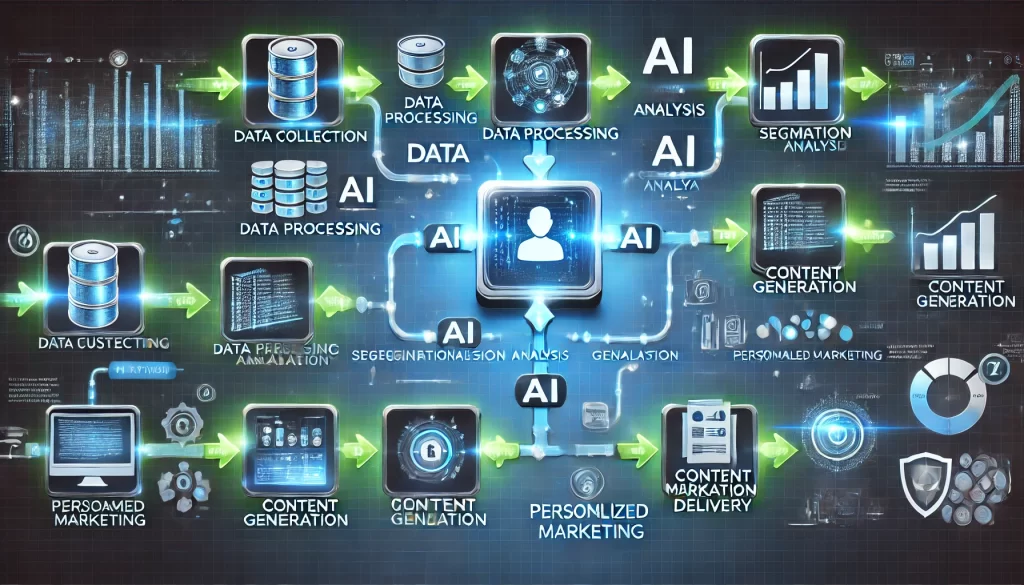
The Rise of AI-Powered Personalization in Digital Marketing
Imagine opening your favorite shopping app and seeing recommendations that feel handpicked just for you. This is AI-powered personalization at work—an innovation that is reshaping digital marketing by leveraging artificial intelligence to analyze vast amounts of consumer data, understand behaviors, and deliver highly targeted content.
In an era where 80% of consumers are more likely to engage with brands that offer personalized experiences (Forbes), businesses are increasingly adopting AI-driven marketing strategies to stay competitive and relevant.
This article explores the rise of AI-driven personalization, its benefits, real-world applications, and challenges to help businesses navigate this digital shift effectively.
Understanding AI in Personalization
AI-powered personalization involves using machine learning algorithms and data analytics to tailor marketing efforts to individual consumers. By processing data such as browsing behavior, purchase history, and demographic information, AI can predict consumer preferences and deliver relevant content.
This approach moves beyond traditional segmentation, offering a more granular and dynamic method to engage customers. AI tools such as CustomGPT make it easier for businesses to integrate AI-driven conversational experiences, providing even more personalized customer interactions.
2. Benefits of AI-Driven Personalization
Implementing AI in marketing personalization offers several advantages:
✅ Enhanced Customer Engagement – Personalized content resonates more with consumers, leading to increased interaction and brand loyalty.
✅ Improved Conversion Rates – Tailored recommendations and offers are more likely to meet consumer needs, resulting in higher sales.
✅ Operational Efficiency – AI automates data analysis and content delivery, allowing marketing teams to focus on strategy and creativity.
✅ Real-Time Adaptation – AI systems can adjust marketing strategies in real-time based on consumer behavior, ensuring relevance and timeliness.
✅ Scalable Content Creation – AI tools like DeepBrain AI enable businesses to generate high-quality, AI-driven video content for personalized digital campaigns.
3. Real-world applications of AI in Personalization
1. E-commerce: AI-Powered Product Recommendations
Retail giants like Amazon and Walmart use AI-powered recommendation engines to suggest products based on user behavior, increasing cross-selling and upselling opportunities.
Example: Amazon’s AI algorithm analyzes search queries and previous purchases to deliver hyper-personalized product suggestions (TechCrunch).
2. Streaming Services: Personalized Content Curation
AI-driven personalization ensures users spend more time on platforms by tailoring recommendations.
Example: Netflix’s AI algorithm uses machine learning to recommend shows based on watch history and engagement (Netflix Tech Blog).
3. Quick-Service Restaurants: AI-Driven Dynamic Menus
Fast food chains like McDonald’s and Taco Bell leverage AI-powered menu boards that adjust recommendations based on weather, time of day, and local trends.
Example: Yum Brands (owner of KFC & Taco Bell) reported that AI-driven marketing boosted customer purchases significantly (WSJ).
4. Retail Industry: Virtual Shopping Assistants
AI-powered chatbots help retailers deliver a personalized shopping experience by suggesting outfits based on user preferences.
Example: Marks & Spencer’s AI tool helps customers choose outfits based on body shape and style preferences (The Guardian).
4. Challenges and Considerations
Despite its benefits, AI-powered personalization comes with challenges that businesses must navigate.
1. Data Privacy Concerns
- Consumers are increasingly concerned about how their data is collected and used.
- Regulations like GDPR and CCPA require businesses to obtain explicit user consent for data processing.
2. Balancing Automation with Human Touch
- Over-automation can make interactions feel robotic.
- Brands must ensure AI complements human-driven marketing efforts.
3. Implementation Costs
- AI-driven solutions require significant investment in technology, infrastructure, and training.
- Small businesses may struggle with high upfront costs.
4. Ethical Implications
- AI algorithms must be trained responsibly to avoid bias in personalized recommendations.
- Transparency in AI decision-making is crucial for maintaining consumer trust.
Conclusion
AI-powered personalization is reshaping the landscape of digital marketing, offering tools to deliver more relevant and engaging content to consumers. By understanding and addressing associated challenges, businesses can leverage AI to enhance customer experiences and achieve their marketing objectives.
🚀 What’s Next? Marketers should explore AI-driven personalization tools like CustomGPT for enhanced customer interactions and DeepBrain AI for personalized AI-generated video content to stay ahead of the competition.
What’s Next?
As AI continues to evolve, expect hyper-personalized, predictive marketing strategies that anticipate user needs before they even realize them.
Are you ready to implement AI-driven personalization in your marketing strategy? Let’s discuss!

Good https://is.gd/tpjNyL